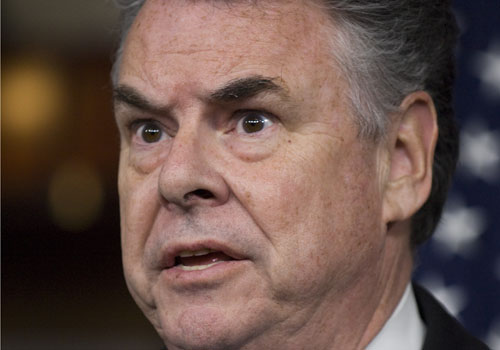There are plenty of problems with these hearings into ‘Muslim Radicalization’ being held today under the sponsorship of Rep. Peter King (R) of New York. High on the list, however, is the fact if you are seriously interested in combatting terrorism and inroads of extremism in the Muslim-American community, this is probably right up there on the list of things you would not do.
Counter-terrorism specialists in the US government have been concerned for some time that an increasing number of Muslims involved in plotting or attempting to pull off attacks in the United States are either American citizens or long-term residents of the United States. Still a minuscule number but a non-trivial one and more than we saw in the first years after 9/11.
Why that would be is open to some question. But there are a few answers that are at least part of the equation. One is the simple fact that the US has put up so many obstacles to getting people into the US that al Qaeda and al Qaeda-like outfits have just redirected their efforts to recruiting and cultivating people who can move freely in the United States. That’s just logical. And it shouldn’t surprise us.
There’s another point that people in the homeland security business have given a lot of thought to. They even have a name for it, “the 9/11 generation.” The idea is this. The experience of American Muslims who came of age pre-9/11 is very different from those who came after. Think of American Muslims over the age of 35. They grew up in a country that probably had some measure of the tensions and difficulties many new immigrant groups face. But probably not ones that were dramatically different from many others before them. Or at least not quite as different from predecessors as it would become after 9/11. Now fast forward to a 25 year old American Muslim today. That person’s formative experiences, particularly if they ‘look’ Muslim or Arab — i.e., if they have dark skin and look like they’re from the Middle East or South Asia — are going to have been very different from his or her 35 year old brother. They both live in the United States today. But the younger person experienced adolescence and early adulthood in a very different way, with the younger cohort living in an atmosphere of heightened surveillance, public suspicion and so forth. In other words, one much more likely to lead to alienation, a sense of otherness and hostility to the larger society.
This is easy to over-simplify and distort on both sides of the equation. And it’s really best to strip away broader arguments about the morality or rights and wrongs of America’s response to 9/11. And just recognize that such a dynamic to some degree is almost inevitable. This may provide a partial explanation, on the supply-side as it were, of the still very tiny but growing number of American Muslims ready to participate in violent acts within the United States.
Now, this can’t mean that we can’t investigate and surveil violent extremists in the United States because the scrutiny itself might lead to more alienation and proclivity to violence. That’s silly. But it does show the complexity of the problem and the inevitable tradeoffs involved.
Given that the problem still appears extremely small in numerical terms, is the most productive use of our time and resources more deeply engaging the American Muslim community — both to diminish feelings of estrangement and build cooperation with law enforcement that will provide tips on violent extremism? Or are we best served by further marginalizing American Muslims and creating a deeper climate of tension and suspicion?
Stated like that, the question really answers itself.
This is actually one of the reasons we’ve provided such close coverage to the growth of socially-sanctioned Islamophobia in recent years in the United States. For the sake of conversation, set aside principled opposition to racism, religious bigotry and systematic violations of the constitution. Let’s say we want the biggest counter-terrorism bang for our buck on the domestic front? How much do you think we accomplish by harassing the local Muslims in Tennessee when they want to build a mosque or a local community center with a swimming pool? Or passing laws outlawing Sharia? Again, stated like that, it seems pretty friggin’ obvious.
Virtually all of what passes itself off as awareness of the threat of Islamic extremism is little more than mindless forms of petty harassment that probably have no effect whatsoever other than some small and incremental increase of the marginalization that is likely the largest single driver of sympathy with violent extremism abroad. You don’t even need to get to all the principled reasons for combatting Islamophobia. You can just oppose it on the general level of its complete unproductiveness as a tool to actually combatting the minuscule but real threat of violent extremism among American Muslims.
Setting aside the hopefully infrequent but still real cases of law enforcement harassment or illicit surveillance of American Muslims, the real work of combatting terrorism is being done by law enforcement down at the ground level, working with local Muslim community leaders, building lines of communication with local communities, doing serious counter-terrorism surveillance. This other stuff is just a mix of ignorance and pandering to prejudice and xenophobia on the right.






